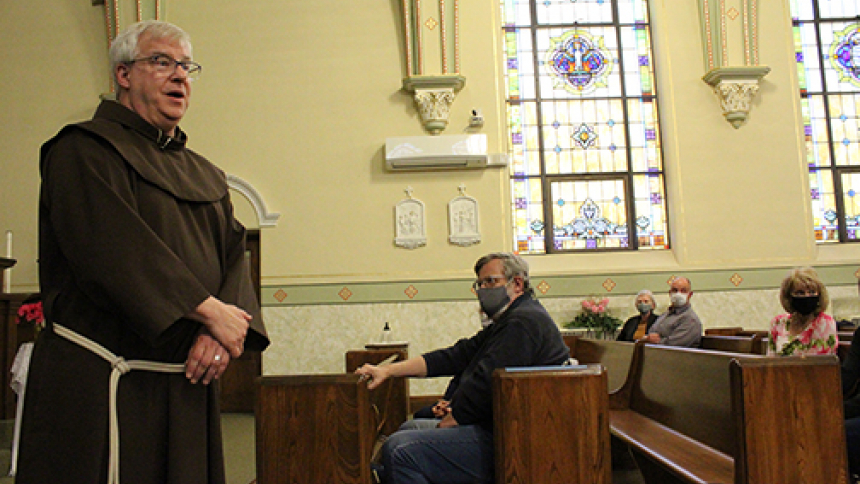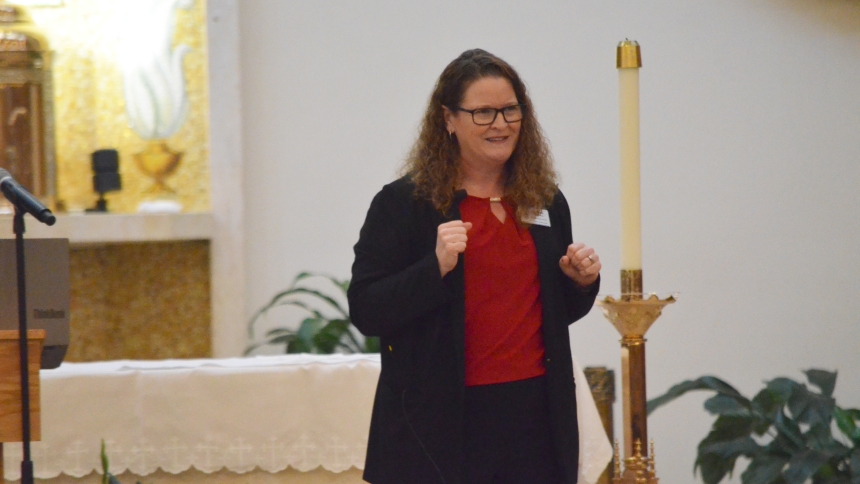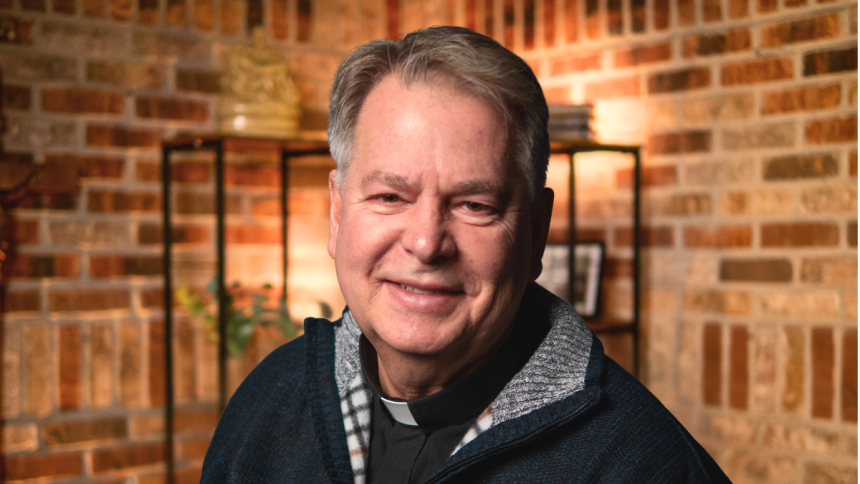
Father Mike Surufka, OFM, discusses his journey to forgiveness during an April 11 talk with parishioners at Holy Name of Jesus in Cedar Lake. The pastor used his own experience with the murder of a fellow Franciscan priest and his best friend in 2002 by a fellow friar who then set the rectory at St. Stanislaus in Cleveland, Ohio on fire to cover the crime as an example of the struggle. (Marlene A. Zloza photo)
“Not only that, but we even boast of our afflictions, knowing that affliction produces endurance, and endurance, proven character, and proven character, hope, and hope does not disappoint, because the love of God has been poured out into our hearts through the holy Spirit that has been given to us.” Romans 5:3-5
CEDAR LAKE | It can be difficult to find forgiveness after a particularly reprehensible act, as Father Michael Surufka, OFM, admitted to his Holy Name of Jesus congregation on Divine Mercy Sunday by sharing an especially painful experience and his journey forward.
“My whole life is now before-and-after that moment,” he admitted on April 11, recalling how a fellow Franciscan priest and his best friend, Father William Gulas, OFM, was murdered in his parish office at St. Stanislaus in Cleveland, Ohio on Dec. 7, 2002. After the shooting, fellow friar (and former Brother) Dan Montgomery tried to cover up his crime by setting fire to the rectory of the historic church.
According to Father Surufka, his misery was compounded by the fact that he was Montgomery’s spiritual director, and believes the troubled friar, who was being transferred out of Cleveland and likely removed from the Franciscan community altogether, had planned to kill him. “Father Willy took my bullet,” said the Holy Name pastor, who was at a conference in Wisconsin when the tragedy took place.
Father Surufka described in detail his hurried return to Cleveland on that Saturday afternoon while the Archbishop of Cleveland filled in as the 5 p.m. Mass celebrant, the agony of dealing with Father Gulas’ death and the destruction of the rectory, and the revelation that Montgomery confessed a day after initially hiding his crime and comforting stricken parishioners at the fire scene.
Walking through the “wet and squishy” rubble of his home the next day, a stunned Father Surufka said he told a parishioner who came by the charred remains of the rectory that, “I have nothing,” having lost his clothing, books and seemingly everything he held dear.
“‘You have us,’ she replied, and that is the moment when I became a Franciscan, (because I suddenly) knew what it meant to have everything when you have nothing,” the priest said.
The large Polish parish and the entire city rallied around the Franciscan community, Father Surufka explained, feeding everyone who came to Evening Vespers the next night with food meant for a Christmas party, hosting a candlelight peace vigil attended by 1,200 people in zero-degree weather, and celebrating Christmas Masses just a week-and-a-half after Father Gulas’ funeral.
Four tall spruce trees in front of the burned-out rectory were decorated for the holidays with white Christmas lights thanks to city employees and equipment, and a concert featuring the church choirs was hosted in January for first responders. “We wanted to let Cleveland know that darkness didn’t live here anymore,” the former parochial vicar noted.
Yet Father Surufka admits he had difficulty facing the issue of forgiveness. “A woman came by the next day (after Montgomery was arrested) and asked me, ‘Have you forgiven Dan?’ and I quickly replied, ‘No, I only found out yesterday (that he had confessed),’” Father Surufka recalled.
Confronting the priest, the woman continued prodding him. “Don’t you pray the Our Father? How can you say those words and not forgive?” she challenged.
“She was right, although she went about it in the wrong way,” said Father Surufka, acknowledging that forgiveness was something he needed to seek. “I thought, I most certainly have been hurt before, and I’ve forgiven people, but I couldn’t remember how. How do I do it?”
Over time, he added, he discovered a sequence that can lead to forgiveness. “First, if you have not yet forgiven, you at least have to want to get there, and then you’ve started. If you hold on to the anger, it hurts only you,” he said.
Secondly, advised Father Surufka, the journey toward forgiveness “needs to be done in some kind of faith community, not by you alone, in isolation, but with people you trust.”
Father Surufka said the third discovery he made is, “The gift of forgiveness is a gift from God, who will lead the process by his timetable, not yours.”
Given a copy of the book “The Ministry of Reconciliation” by Father Robert Schreiter, a Catholic Theological expert on the dynamics of reconciliation, Father Surufka admitted he wasn’t ready to read it until months later, when he found the ideas very valuable.
Refuting the traditional path to reconciliation – acknowledgment, repentance, forgiveness and reconciliation – Father Schreiter claims that reconciling with what happened comes first, Father Surufka explained.
“You have to be reconciled that you will not be the same, that you are different, and that God does not expect you to forgive and forget,” Father Surufka said. “Father Schreiter says you will remember the hurtful thing, but in a new way, and it has no power over you (anymore).”
On Good Friday, noted Father Surufka, Jesus says from the cross, ‘Father forgive them, for they know not what they do,’ asking his Heavenly Father to do the forgiving for him, since he is still being hurt.
“My advice is to ask God to help you get (to a place of forgiveness) and ask God to do the forgiving that you cannot yet do,” he added.
Father Schreiter, he added, encouraged those still healing to “take small steps, do little things, do something,” and that’s what the St. Stanislaus parish family did by hosting healing and holiday events and Masses.
“You have to keep doing something, and soon you realize that the sun rises and sets, day after day, month by month, and you are still there,” said Father Surufka, adding that he eventually realized “that I must have forgiven Dan, because the event no longer had power over me.”
After he forgave Montgomery, added Father Surufka, he was ready to see him in jail, until Montgomery began to recant his criminal confession, claiming the police had pressured him. “So I have not gone to see him; I would if he accepted what he did, and I’d tell him that I forgave him. But if you require that repentance to forgive, you give that other person the power. Your forgiveness does not depend on them,” Father Surufka explained.
Forgiveness, Father Surufka added, does not mean he wants Montgomery, who could still be a threat to the priest, to be released from prison.
Evil is not the will of God, Father Surufka noted. “There are some things God cannot do, like force anyone to love him, because then (the love) is not freely given. But he can be radically (and thoroughly) with someone who suffers evil. He cries with you, suffers with you. God is the only one who understands what you are going through.”
Father Surufka concluded by quoting St. Paul‘s letter to the Romans about suffering: “Hope does not disappoint.”
(Father Surufka, OFM first told the story of the Shrine Church of St. Stanislaus in Cleveland, Ohio in a February 2018 issue of the Northwest Indiana Catholic, which reprinted an article that first appeared in the #FriarFriday feature of USFranciscans.org, the national OFM Franciscan site.)


